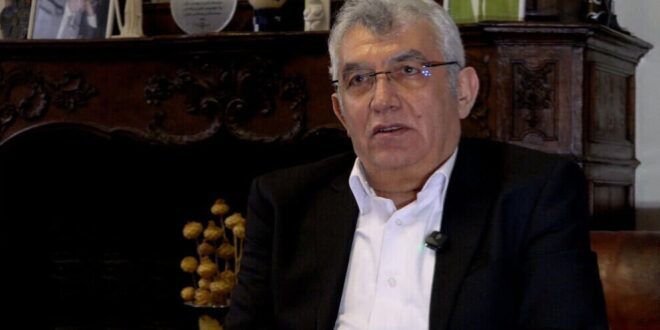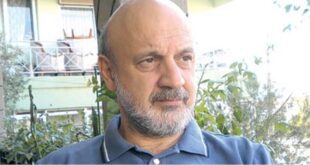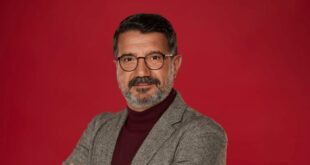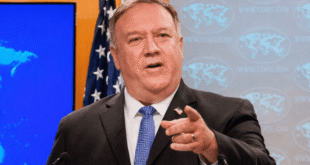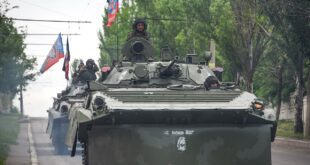Zubeyir Aydar, Executive Council Member of the Kurdistan Communities Union (KCK) said that the Treaty of Lausanne lost its meaning and called all Kurdish forces to join the July 26 march in Lausanne.
On July 24, 1923, a treaty signed at the Rumine Palace in Lausanne between Turkey, the United Kingdom, France, and their allies would go down in international history as the Treaty of Lausanne. Yet with its implementation, it became the beginning of a tragic era for the Kurdish people and the people of Kurdistan, marking the onset of both cultural and physical genocide.
And so it happened. This treaty, which legitimized the partitioning of Kurdistan into four parts by colonial powers, left the future of the Kurdish people at the mercy of Arab, Persian, and Turkish domination. One hundred and two years later, this agreement remains a deep wound in the history of the Kurdish people and stands as a symbol of enduring injustice. For this reason, the anger and resistance of the Kurdish people toward this treaty has never subsided; on the contrary, it has grown with each generation to the present day.
Switzerland and Lausanne in particular, which hosted the colonial powers at the table in 1923, will once again witness a moment of historical reckoning on the anniversary of the treaty this year, as it has every year. On the 102nd anniversary of the Treaty of Lausanne, the children of the Kurdish people, those who were excluded from the table and left to the mercy of colonialism for a century, will take to the streets of Lausanne to voice their anger and their refusal.
Marking the 102nd year of the Treaty of Lausanne, a march and rally will be held in Lausanne on Saturday, July 26.
Zubeyir Aydar, Executive Council Member of the Kurdistan Communities Union (Koma Civakên Kurdistan – KCK), spoke to ANF. He discussed the significance of this march and what the Treaty of Lausanne represents today in light of current developments in the region.
You will be organizing a large march in Lausanne on Saturday, July 26, to mark the 102nd anniversary of the Treaty of Lausanne. Considering current developments in the region, what will be the main message and purpose of this march? In what ways does this year’s event differ from previous years?
The Treaty of Lausanne has long been on our agenda, on the agenda of all Kurds. Because with this treaty, the victors of World War I came together a century ago and divided our homeland, placed it under the control of different states, and did not even mention the name of the Kurds. For us, this treaty is a deep trauma. Even today, we continue to feel the pain caused by its consequences. From our perspective, this treaty marks the beginning of a genocide, a process of annihilation, a chain of massacres.
The historical consequences of the Treaty of Lausanne are still in effect. That is why it remains on our agenda. Since the early days of Kurdish organizing in Europe, events have been held on every anniversary of the treaty. Conferences have also been organized on significant anniversaries. On the 75th anniversary, for example, a conference was held.
A message from President Öcalan was conveyed to that conference. That particular event was organized mainly by groups close to our movement. Most recently, on the 100th anniversary, a major conference was held in Lausanne with the participation of various Kurdistani forces. Some important decisions were taken there, and now we have reached the 102nd anniversary. On this occasion, we will again hold several events. However, this year’s gathering has a distinct character.
Why is this year considered more critical than others? As the region faces the possibility of a new geopolitical restructuring, what position should the Kurds take in this process?
Right now, our region is undergoing a major upheaval. Especially since the offensive launched by Hamas in October 2023, the developments unfolding in the region have also affected Kurdistan. Over the past two years, it has become increasingly clear that both the Sykes-Picot order and the Lausanne order are no longer functioning and are being surpassed.
There is a large-scale war unfolding in our region. This war is not limited to Palestine; although it began there, it has spread to the entire region. Kurdistan is also part of this process. It is quite possible that borders may change, and the systems and political statuses across the Middle East may be reshaped.
That is why we are calling on all Kurds to come to Lausanne. The focus of this year’s event is not just the past of Lausanne, but also its present and future. Of course, the historical dimension and the devastation it caused remain in our minds.
But this year’s main theme is the following: The Lausanne status quo is being surpassed. What must we Kurds do in this new period? As the region is being restructured, what stance should the Kurds take? This is the central issue and the main topic we must discuss. For this reason, this anniversary carries a different significance than previous years.
There is a dialogue and peace process currently unfolding in Kurdistan. Discussions, negotiations, and efforts are underway concerning a peaceful resolution to the Kurdish question. This is an extremely important process for all Kurds.
Everyone has a responsibility in this. What should we do? This question carries great weight for all Kurds. Because Northern Kurdistan (Bakur) is the largest part, both in terms of population and geography, it borders the other parts and directly affects them. Moreover, among the occupying powers, Turkey is the state that most actively wages hostility against the Kurds. Therefore, a solution there would represent a solution for Kurdistan as a whole. This is also part of our agenda.
When we look at Eastern Kurdistan (Rojhilat), we see that Iran is on the brink of a major war. A ceasefire may have been reached with Israel, but both sides continue to prepare for war. The core issues have not been resolved. Iran’s nuclear program continues, while Israel and the United States pursue a strategy of a nuclear-free Iran.
These developments directly affect Kurdistan. Rojhilat is the second-largest part of Kurdistan, both in population and territory. Therefore, any change there concerns us very closely. Kurds must be prepared for this process.
When we look at Southern Kurdistan (Başur), there is an officially recognized federal status. However, the problems remain unresolved. Article 140 of the Iraqi Constitution has still not been implemented. According to this article, a referendum should have been held 20 years ago across a vast region stretching from Shengal to Mosul, from Maxmur to Kirkuk. But no such step has been taken. Many other issues also await resolution.
Iran’s influence over Başur, and its occasional interventions, continue, as do Turkey’s military incursions.
Shengal is a particularly important issue for us. The massacres that have taken place there are not over. The Maxmur issue is also ongoing. When we look at the South, we see a large number of unresolved problems.
In Rojava, there has been a de facto autonomous status for the past 13 years. However, this status has not been recognized constitutionally or legally. This structure must gain official recognition. A new system of governance is taking shape in Syria. Radical Islamist groups still maintain influence there. These groups, which now hold sway in Damascus, are targeting Druze, Alevi, and Christian communities. There is also the possibility that these attacks could turn against Kurds. All of these issues must be addressed and discussed thoroughly in the current period.
In the face of all these regional developments, what kind of collective response does the event in Lausanne aim to create, and to whom are you extending your call?
The developments in the region are calling us to responsibility. The current conditions are placing new duties on our shoulders. That is why, on the 102nd anniversary of Lausanne, we are inviting all Kurds to Lausanne with a sense of historical responsibility. We are saying: Come, let us discuss this process together.
The Kurdistan National Congress (KNK) has initiated a discussion on this matter. In its Executive Council meeting held during the first week of this month, a plan was laid out for this process. The issue of national unity now stands before us as an urgent task. At the conference we held on the 100th anniversary of Lausanne, a decision was made to convene a national unity conference, but this has yet to be implemented in practice. That is why we are calling on everyone who wishes to contribute to this process verbally to come to Lausanne. This is not just a march or a rally, it is also a forum for ideas.
The format of the event has been shaped accordingly. It will take the form of a semi-assembly, a platform. Each party, institution, and individual will have the opportunity to share their thoughts and proposals. Not only Kurds, but all people of Kurdistan are invited. Assyrians and Syriacs will be there as well. Representatives of all faiths will take part. On July 26 in Lausanne, we want to raise a unified voice to the world on behalf of Kurdistan.
This call is addressed both to the Kurds and to the international community. We say: At a time when there are so many unresolved problems in our region, when a new Lausanne process is being spoken of, when the old status quo has been surpassed, what position will the Kurds take in the emerging new order? Come, let us think together, let us discuss together. Let us gather at a national unity conference. We will be making such calls.
We will also make a call to the world: We will demand that the great injustice committed a century ago be rectified. One hundred years ago, the victorious powers of the time gathered and divided Kurdistan into four parts, without even mentioning the name of the Kurds. This was a grave injustice. We will call on the powers of the world to act against this injustice. Even if a century has passed, this historical wrong must be acknowledged and corrected. We will seek support for the recognition of the Kurdish people’s inalienable rights. Our calls will be framed within this context.
That is why we are approaching this year’s event with a different perspective and great importance. We invite all people of Kurdistan and all friends of the Kurdish people to join us in Lausanne.
As you mentioned, the October 7 Hamas attack has shifted the balance in the Middle East. New political statuses are emerging. In this context of changing dynamics, do you believe the Treaty of Lausanne should be reconsidered in relation to the status of the Kurdish people?
That is exactly what we are discussing and in fact, we have been discussing it for years. This injustice must be rectified. The Lausanne status quo is unacceptable. This treaty was imposed on us as a death sentence. It must be surpassed. Kurds must have a place in the emerging new order, with their own identity, culture, and rights. That is how we are framing it, that is how we are expressing it. This is not a position taken against anyone. We exist in that region, we are a country, we are a people. We too must attain a status. The status imposed in Lausanne was built on our erasure. We cannot and will not accept that. We are rising up against it. We demand a new reality, a new treaty, a new agreement.
When you say a new agreement, do you mean one that would be recognized by international powers?
Whoever is involved, what matters is that it is an agreement accepted by all relevant parties. Especially the peoples of the region. If we, among ourselves, can reach such an agreement, there may be no need for much from outside. But that region is of global interest, it concerns the entire world.
What is unfolding in the region is, in fact, a world war. A Third World War is taking place, spread over time and geography. In this sense, we want a discussion that includes everyone involved. We want a discussion that is approved by all relevant actors. What we want is a new status quo, one in which the Kurds have their rightful place.
These demands will be clearly voiced during the march on July 26, correct?
Yes, our demands will be voiced there. The KNK will issue a declaration at the event. A discussion will be initiated there, but it will not end there, it will continue. A new agenda will be laid out before the Kurdish people. We believe that this should be the direction of the agenda going forward.
You stated that the Treaty of Lausanne must be renewed and that a new agreement is needed. Considering current regional developments, do you think such a discussion could realistically begin in the short term?
From our perspective, such a discussion is always possible, in fact, it is necessary. There is a great injustice at hand. It must be rectified. And we are fighting for that.
A major conference was held in Lausanne on the 100th anniversary of the Treaty of Lausanne. Moreover, Kurds not only from all four parts of Kurdistan but also from many different regions around the world participated. A final declaration was issued at the end of the conference, outlining the necessary steps to be taken. How much of that has actually been implemented? And if not, what have been the main obstacles?
As one of the organizers of that conference, someone who was involved in its organization from beginning to end, I fully stand behind all of its decisions. We are calling for the implementation of those decisions. The most important issue is national unity. We have not yet been able to achieve the level of results we had hoped for on that front. That is why, on Saturday, we will once again raise our voices to reaffirm the outcomes of that conference. In fact, this year’s event will largely build upon and reference that gathering.
Finally, is there anything else you would like to add, any message for the march to be held in Lausanne on Saturday, July 26, marking the 102nd anniversary of the Treaty of Lausanne?
Above all, I call on everyone, all Kurdistani forces, to recognize the urgency of the current moment, to come to Lausanne, to speak their truth, and then to act together in accordance with that collective voice.
This article was originally published by ANF.
 Infowelat Enformasyon Ji Bo Welat
Infowelat Enformasyon Ji Bo Welat
